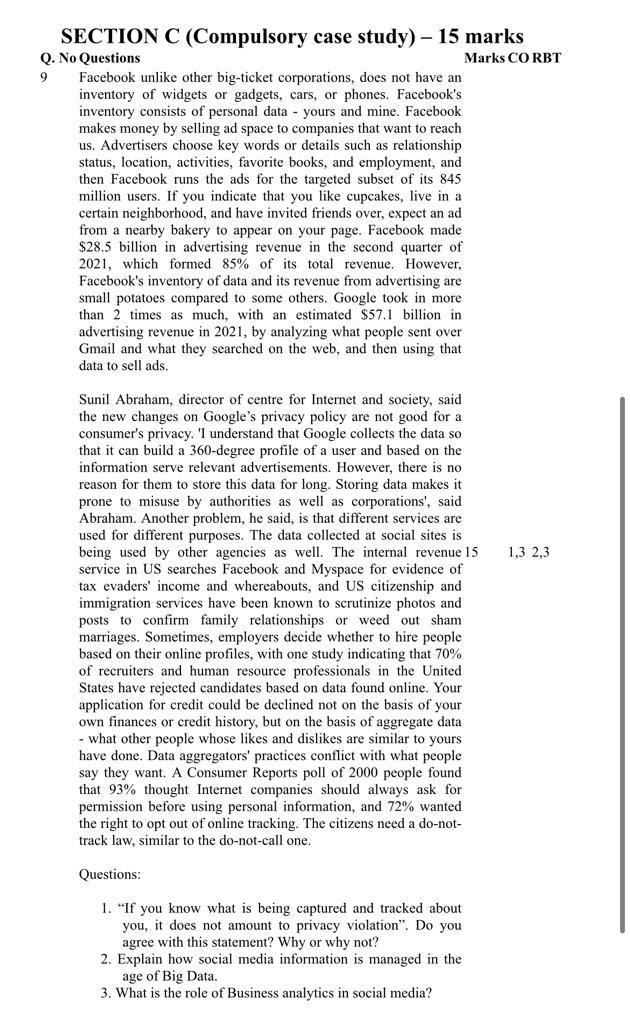Answered step by step
Verified Expert Solution
Question
1 Approved Answer
9 SECTION C (Compulsory case study) - 15 marks Q. No Questions Marks CO RBT Facebook unlike other big-ticket corporations, does not have an inventory

9 SECTION C (Compulsory case study) - 15 marks Q. No Questions Marks CO RBT Facebook unlike other big-ticket corporations, does not have an inventory of widgets or gadgets, cars, or phones. Facebook's inventory consists of personal data - yours and mine. Facebook makes money by selling ad space to companies that want to reach us. Advertisers choose key words or details such as relationship status, location, activities, favorite books, and employment, and then Facebook runs the ads for the targeted subset of its 845 million users. If you indicate that you like cupcakes, live in a certain neighborhood, and have invited friends over, expect an ad from a nearby bakery to appear on your page. Facebook made $28.5 billion in advertising revenue in the second quarter of 2021, which formed 85% of its total revenue. However, Facebook's inventory of data and its revenue from advertising are small potatoes compared to some others. Google took in more than 2 times as much, with an estimated $57.1 billion in advertising revenue in 2021, by analyzing what people sent over Gmail and what they searched on the web, and then using that data to sell ads. 1,3 2,3 Sunil Abraham, director of centre for Internet and society, said the new changes on Google's privacy policy are not good for a consumer's privacy. 'I understand that Google collects the data so that it can build a 360-degree profile of a user and based on the information serve relevant advertisements. However, there is no reason for them to store this data for long. Storing data makes it prone to misuse by authorities as well as corporations', said Abraham. Another problem, he said, is that different services are used for different purposes. The data collected at social sites is being used by other agencies as well. The internal revenue 15 service in US searches Facebook and Myspace for evidence of tax evaders' income and whereabouts, and US citizenship and immigration services have been known to scrutinize photos and posts to confirm family relationships or weed out sham marriages. Sometimes, employers decide whether to hire people based on their online profiles, with one study indicating that 70% of recruiters and human resource professionals in the United States have rejected candidates based on data found online. Your application for credit could be declined not on the basis of your own finances or credit history, but on the basis of aggregate data - what other people whose likes and dislikes are similar to yours have done. Data aggregators' practices conflict with what people say they want. A Consumer Reports poll of 2000 people found that 93% thought Internet companies should always ask for permission before using personal information, and 72% wanted the right to opt out of online tracking. The citizens need a do-not- track law, similar to the do-not-call one. Questions: 1. "If you know what is being captured and tracked about you, it does not amount to privacy violation. Do you agree with this statement? Why or why not? 2. Explain how social media information is managed in the age of Big Data. 3. What is the role of Business analytics in social media? 9 SECTION C (Compulsory case study) - 15 marks Q. No Questions Marks CO RBT Facebook unlike other big-ticket corporations, does not have an inventory of widgets or gadgets, cars, or phones. Facebook's inventory consists of personal data - yours and mine. Facebook makes money by selling ad space to companies that want to reach us. Advertisers choose key words or details such as relationship status, location, activities, favorite books, and employment, and then Facebook runs the ads for the targeted subset of its 845 million users. If you indicate that you like cupcakes, live in a certain neighborhood, and have invited friends over, expect an ad from a nearby bakery to appear on your page. Facebook made $28.5 billion in advertising revenue in the second quarter of 2021, which formed 85% of its total revenue. However, Facebook's inventory of data and its revenue from advertising are small potatoes compared to some others. Google took in more than 2 times as much, with an estimated $57.1 billion in advertising revenue in 2021, by analyzing what people sent over Gmail and what they searched on the web, and then using that data to sell ads. 1,3 2,3 Sunil Abraham, director of centre for Internet and society, said the new changes on Google's privacy policy are not good for a consumer's privacy. 'I understand that Google collects the data so that it can build a 360-degree profile of a user and based on the information serve relevant advertisements. However, there is no reason for them to store this data for long. Storing data makes it prone to misuse by authorities as well as corporations', said Abraham. Another problem, he said, is that different services are used for different purposes. The data collected at social sites is being used by other agencies as well. The internal revenue 15 service in US searches Facebook and Myspace for evidence of tax evaders' income and whereabouts, and US citizenship and immigration services have been known to scrutinize photos and posts to confirm family relationships or weed out sham marriages. Sometimes, employers decide whether to hire people based on their online profiles, with one study indicating that 70% of recruiters and human resource professionals in the United States have rejected candidates based on data found online. Your application for credit could be declined not on the basis of your own finances or credit history, but on the basis of aggregate data - what other people whose likes and dislikes are similar to yours have done. Data aggregators' practices conflict with what people say they want. A Consumer Reports poll of 2000 people found that 93% thought Internet companies should always ask for permission before using personal information, and 72% wanted the right to opt out of online tracking. The citizens need a do-not- track law, similar to the do-not-call one. Questions: 1. "If you know what is being captured and tracked about you, it does not amount to privacy violation. Do you agree with this statement? Why or why not? 2. Explain how social media information is managed in the age of Big Data. 3. What is the role of Business analytics in social media
Step by Step Solution
There are 3 Steps involved in it
Step: 1

Get Instant Access to Expert-Tailored Solutions
See step-by-step solutions with expert insights and AI powered tools for academic success
Step: 2

Step: 3

Ace Your Homework with AI
Get the answers you need in no time with our AI-driven, step-by-step assistance
Get Started


